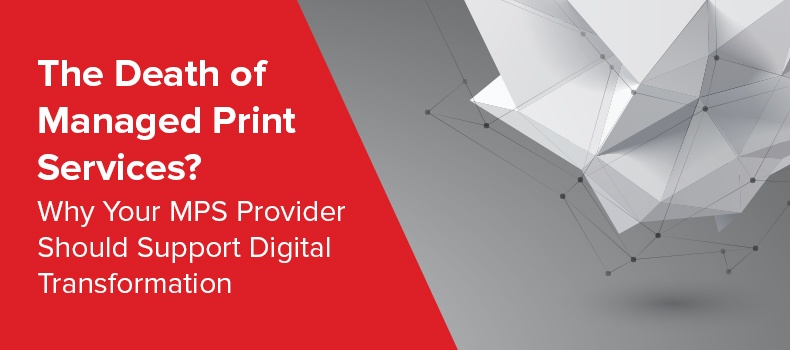Stay up to date with our latest news and insights
Supporting description on the types of content that feature in the blog.
05 April 2016

Experience the benefits of digitisation through the most unlikely of sources – Managed Print Service providers.
At first glance, the idea of Managed Print Services providers promoting digitisation as part of their offering may seem surprising. Their services have traditionally focused on paper-based processes, and promoting what is in effect a ‘rival’ could be seen as self-cannibalisation.
But in recent years, the sector has seen the emergence of a new breed of MPS provider, one that understands the benefits of digitisation and the dramatic impact it can have on enterprises wanting to move away from print and into digital. Instead of viewing digital as a threat to their bottom line, these forward-thinking providers have embraced what they regard as an opportunity, building digital transformation into their core print service offering and creating a ‘hybrid’ model for enterprise to exploit.
And businesses already using MPS to drive their digital transformation strategy are busy reaping the rewards, according to Quocirca's Managed Print Services Landscape 2015 report:
51%
of respondents who partner with an MPS rate their ability to integrate paper and digital workflows as effective or very effective.
Compared with:
9%
of respondents who do not use MPS.
Most organisations understand the benefits that MPS providers can bring to their print infrastructure, introducing strategies that reduce wasteful printing and inefficient printer use, while optimising existing enterprise print fleets and driving down associated costs, which can be substantial.
But it is this very ability to analyse a company’s existing print infrastructure that puts ’hybrid’ MPS providers in an ideal position to identify where and how any push for digital transformation should be deployed, to complement a print strategy rather than clash with it. Because of this unique perspective, investment in a digital/print strategy implemented by a good MPS provider will stand the best possible chance of delivering on its potential, covering the entire enterprise information lifecycle from workflows through to content management.
Critically, a reputable provider will be willing to offer costings and forecasts upfront before any implementation plans are signed off. Indeed, a key benefit of MPS is the ability to measure, analyse and then quantify the benefits of automation in terms of cost reduction and time savings. This provides a clear business case and ROI statement, making the abstract benefits of automation very real, as well as giving the company the reassurance they need as they prepare to make the investment.This allows facilities managers to present the ROI-focused information they need to get buy-in from the board financially and culturally, and all framed within a strategy that will keep any potential disruption to the business to a bare minimum.
To deliver on the investment, the right MPS provider will have a fleet of hardware and software solutions to aid in implementation and rollout. Advanced multifunction printers can scan and route previously paper-based processes while other innovative tech can be deployed for the digital capturing of paper-based documents or unstructured data whether it be email, fax, snail mail or legacy information in need of archiving. The resulting digitised documents can be securely stored in the cloud and made accessible remotely, on a 24/7 basis, boosting the potential for sharing and collaboration within the enterprise.
Another key target for any business’ drive for digital transformation is to reduce the amount of manual labour required by its paper-based operations – think expenses and contract management and that bane of businesses everywhere, accounts payable and receivable. MPS can help automate these time and resources-hungry processes, removing the bottlenecks traditionally associated with paper-based workflows.
But no matter how powerful, flexible and scalable the above feature sets are, companies must be able to monitor new systems on a rolling basis and exploit the resultant data. A reputable MPS provider can help here too, by deploying virtual dashboards that offer real-time insights into any big data accrued. Better still, the information will be tailored to the company’s business, covering the entire gamut of their operations from, say, employee printer use and wastage to identifying emerging issues within the company’s communications structure and areas that require further optimisation.
Such comprehensive offerings highlight the benefits of digitisation and how suitable MPS providers can cater to all client requirements within a single package. And far from cannibalising their own businesses, it can be successfully argued that the new breed of MPS providers represents the future of digital transformation, acting as a conduit for enterprise between the old processes of paper and the brave new world of digitisation.
Supporting description on the types of content that feature in the blog.

20-09-2024
Digital document management tools offer a range of compelling benefits for businesses, including a PDF editor, a file converter and a form generator. You can also integrate with digital signatures qui...

20-09-2024
When choosing a SaaS software to deal with your company’s PDF documents and enable forms to be digitally sent and signed, you’ll want a product that’s user-friendly and easy to use. With Tungsten’s Po...

11-07-2024
Belkin is a global technology company that provides high-quality electronics products, from wireless chargers to power banks. Their people-centric approach and best-in-class functionality have positio...